JH-IRU Strengthens RS-10 In-Country Collaborations with Training and Capacity Development
With an estimated 1.2 million people dying in each year, road traffic crashes are a serious, but sadly, often overlooked disease burden around the world. This burden is more severe in low- and middle-income countries, where road traffic fatality rates are double what they are in developed countries.
To address this burgeoning trend, in 2010 and with funding from Bloomberg Philanthropies, the Johns Hopkins International Injury Research Unit (JH-IIRU) joined a consortium of six partners in the Road Safety in 10 Countries Project (RS-10), a five-year initiative dedicated to reducing the burden of road traffic injuries in ten low- and middle-income countries by evaluating and implementing road safety solutions in places where interventions are needed the most.
The goal of the project is simple: save lives by providing evidence for stronger road safety interventions around the world. But the IIRU team can’t accomplish this goal alone. In order to be effective, they depend on local personnel in each country to not only help develop strong ties within each targeted community, but to conduct evaluations and collect data at each site. To that end, the JH-IIRU team has created a training and capacity development component of the RS-10 project.
Since the project’s inception, and through a program built on a country-specific mission, a sound public health approach, and scientific rigor, the JH-IIRU addresses the basic sciences of public health, a social science component, and health systems analysis with a special focus on ethical and cultural issues. JH-IIRU has developed and employed a concerted, three-pronged strategy for capacity development comprising of 1) Learning by doing 2) Courses and 3) Workshops.
Led by JH-IIRU Associate Director, Abdulgafoor M. Bachani, in the first two years of the program these three approaches have yielded impressive results and continue to do so. In each country, JH‐IIRU collaborates with local research groups or universities to facilitate data collection for monitoring and evaluation. In this learning by doing approach, the JH-IIRU staff trains local collaborators for data collection through activities such as observational studies, road-side interviews, database creation and data analysis, to name a few.
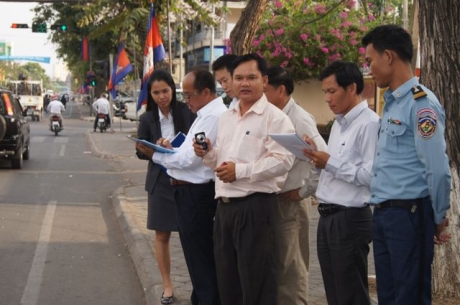
Participants learning how to conduct observational studies in Cambodia.
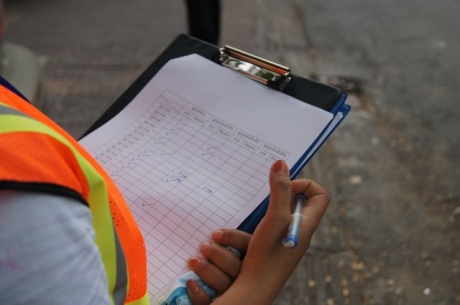
Helmet use observational study.
The important results of this work are showcased in the special issue of the journal Traffic Injury Prevention.
Building on existing coursework at JHSPH, JH-IIRU has also developed and modified courses specific to the global burden of road traffic injuries. Working to create live (in-person) and online versions of many of their offerings, the team offers a sequence of four courses to comprise an innovative program in Road Traffic Injury Prevention and Control. These courses combine the expertise at JH-IIRU with the specific local needs of participating countries. Free access to course materials for two of the courses via the OpenCourseWare (OCW) system at JHU is already available, while the remaining two classes will be made available shortly. This long-distance learning option makes effective training for health and allied professionals in each country possible.
Finally, since 2010, the JH-IIRU has conducted workshops in each of the 10 countries, which have been tailored to meet local needs. More than 445 individuals from each country have been trained in topics ranging from data collection and management, to evaluation methods for road safety, to handing of data for injury surveillance. Recently, members of the JH-IIRU team hosted workshops in Phnom Penh, Cambodia. The National Workshop on Evaluation Methods for Road Safety focused on topics such as evaluation designs, data collection methodologies, database creation and management, data analysis, and dissemination of findings, while at the same time provided an opportunity for cross-country collaboration.
In an article which appeared in Cambodia’s Koh Sentepheap newspaper, attendee H.E. Mr. Peou Maly, Deputy Secretary General of General Secretariat of the National Road Safety Committee, applauded the workshop, saying he firmly believed it would contribute to efforts of the Royal Government of Cambodia in reducing the number of road crashes.
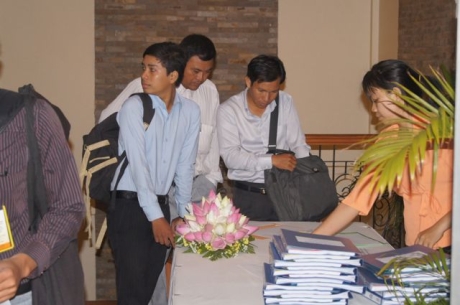
Participants register for a training workshop.
In Kenya, JHU-IIRU held a training workshop in March to train Naivasha district hospital data collectors and hospital administrators on the data collection for the trauma registry.
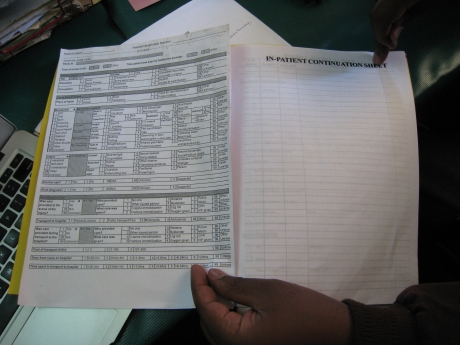
An example of a trauma registry form, Naivasha Hospital
And in Russia, JHU-IIRU held workshops in February and March 2012. Seventy professors and data collectors from Ivanovo University were trained to conduct both observational studies and roadside surveys on seatbelt use and speeding during a two- day workshop. A three-day workshop to address data gaps in surveillance and registry systems was attended by 40 representatives from the Ivanovo Ministry of Health, Lipetsk Ministry of Health, Ivanovo Regional Accident and Trauma Centre, and Lipetsk Regional Accident and Trauma Centre. Members of the Lipetsk Regional Accident and Emergency Trauma Centre indicated that the data collection approach they learned will help them not only to build their own data collection system for collecting and reporting the data within the RS-10 project, but also help to improve their own data collection processes in their daily work. It is vital, attendees said, to have their daily data collection work verified with police in order to ensure the quality of the collected data.
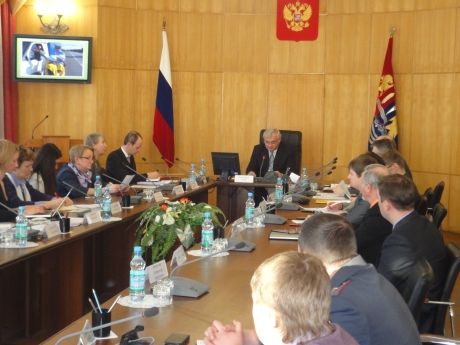
Attendees at a workshop in Ivanovo, Russia
In addition to these in-country workshops, JH‐IIRU has also facilitated cross-country learning through a special session at the Safety 2010 World Conference on Injury Prevention and Safety Promotion in London, and a collaborators workshop in Baltimore in October 2011. These workshops made possible important cross‐country discussions on data collection strategies, standardizing methods across countries, and challenges as well as planning for more effective evaluation strategy in each country. Based on the success of these sessions, JH-IIRU is exploring hosting a scientific session on RS‐10 at theWorld Conference on Injury Prevention and Safety Promotion in New Zealand, 2012.
Training and capacity development is a vital part of the RS-10 project that will help ensure in-country collaborators, partners and researchers are an integral and effective part of the projects efforts to reduce the growing burden of road traffic injuries worldwide.
To find out more, please contact us at IIRU@jhsph.edu
